(you can listen using text-to-speech on your device)
JOHN WINSTON LENNON SMITH
John Lennon is very keen on books, will always ask what is good to read.
He buys quantities of books and these are kept tidily in a special room.
He has Swift, Tennyson, Huxley, Orwell...
"I've read millions of books.
That's why I seem to know things."
John Lennon's middle name was "Winston" like Orwell's 1984 hero "Winston" Smith, and both of them had a kindred spirit named "Julia".
Note: The name of John's aunt (his mother Julia's sister) who raised him was Mimi SMITH. So John truly was a John Winston Lennon Smith.
Note also: The name of John's beloved uncle (his aunt Mimi's husband) was George Smith (another similarity John has to George Orwell):
John and Orwell were similar also in the way they understood how the rich and the powerful lord it over the "working man".
See if you recognize the Orwellian themes in the following John Lennon interviews and writings conducted when he was still himself and hadn't yet been dragged down by Yoko Ono and drugs (in that order). This was the type of thinking that earned John Lennon the respect of the masses above and beyond our love and admiration for him as one of the greatest musicians of all time.
All the best,
Jackie Jura
HOW DOES A BEATLE LIVE? JOHN LENNON LIVES LIKE THIS
by Maureen Cleave, London Evening Standard, March 4, 1966
...He is much the same as he was before. He still peers down his nose, arrogant as an eagle, although contact lenses have righted the short sight that originally caused the expression. He looks more like Henry VIII than ever now that his face has filled out - he is just as imperious, just as unpredictable, indolent, disorganised, childish, vague, charming and quick-witted. He is still easy-going, still tough as hell...
Experience has sown few seeds of doubt in him: not that his mind is closed, but it's closed round whatever he believes at the time. 'Christianity will go,' he said. 'It will vanish and shrink. I needn't argue about that; I'm right and I will be proved right. We're more popular than Jesus now; I don't know which will go first-rock 'n' roll or Christianity. Jesus was all right but his disciples were thick and ordinary. It's them twisting it that ruins it for me.' He is reading extensively about religion...
He is now 25. He lives in a large, heavily panelled, heavily carpeted, mock Tudor house set on a hill with his wife Cynthia and his son Julian. There is a cat called after his aunt Mimi, and a purple dining room. Julian is three; he may be sent to the Lycde in London. 'Seems the only place for him in his position,' said his father, surveying him dispassionately. 'I feel sorry for him, though. I couldn't stand ugly people even when I was five. Lots of the ugly ones are foreign, aren't they?'.
We did a speedy tour of the house, Julian panting along behind, clutching a large porcelain Siamese cat...
He paused over objects he still fancies; a huge altar crucifix of a Roman Catholic nature with IHS on it; a pair of crutches, a present from George; an enormous Bible he bought in Chester; his gorilla suit...
He is very keen on books, will always ask what is good to read. He buys quantities of books and these are kept tidily in a special room. He has Swift, Tennyson, Huxley, Orwell, costly leather-bound editions of Tolstoy, Oscar Wilde. Then there's Little Women, all the William books from his childhood; and some unexpected volumes such as Forty-One Years In India, by Field Marshal Lord Roberts, and Curiosities of Natural History, by Francis T. Buckland. This last-with its chapter headings 'Ear-less Cats', 'Wooden-Legged People,' 'The Immortal Harvey's Mother'-is right up his street.
He approaches reading with a lively interest untempered by too much formal education. 'I've read millions of books,' he said, 'that's why I seem to know things.' He is obsessed by Celts. 'I have decided I am a Celt,' he said. 'I am on Boadicea's side-all those bloody blue-eyed blondes chopping people up. I have an awful feeling wishing I was there-not there with scabs and sores but there through reading about it. The books don't give you more than a paragraph about how they lived; I have to imagine that.'
He can sleep almost indefinitely, is probably the laziest person in England. 'Physically lazy,' he said. 'I don't mind writing or reading or watching or speaking, but sex is the only physical thing I can be bothered with any more.' Occasionally he is driven to London in the Rolls by an ex-Welsh guardsman called Anthony; Anthony has a moustache that intrigues him.
The day I visited him he had been invited to lunch in London, about which he was rather excited. 'Do you know how long lunch lasts?' he asked. 'I've never been to lunch before. I went to a Lyons the other day and had egg and chips and a cup of tea. The waiters kept looking and saying: "No, it isn't him, it can't be him".'...
We bowled along in a costly fashion through the countryside. 'Famous and loaded' is how he describes himself now. 'They keep telling me I'm all right for money but then I think I may have spent it all by the time I'm 40 so I keep going. That's why I started selling my cars; then I changed my mind and got them all back and a new one too.
'I want the money just to be rich. The only other way of getting it is to be born rich. If you have money, that's power without having to be powerful. I often think that it's all a big conspiracy, that the winners are the Government and people like us who've got the money. That joke about keeping the workers ignorant is still true; that's what they said about the Tories and the landowners and that; then Labour were meant to educate the workers but they don't seem to be doing that any more.'
He has a morbid horror of stupid people: 'Famous and loaded as I am, I still have to meet soft people. It often comes into my mind that I'm not really rich. There are really rich people but I don't know where they are.'
He finds being famous quite easy, confirming one's suspicion that The Beatles had been leading up to this all their lives. 'Everybody thinks they would have been famous if only they'd had the Latin and that. So when it happens it comes naturally. You remember your old grannie saying soft things like: "You'll make it with that voice."' Not, he added, that he had any old grannies...
[We] went to Brian Epstein's office...The rumour came through that a Beatle had been sighted walking down Oxford Street! He brightened. 'One of the others must be out,' he said, as though speaking of an escaped bear. 'We only let them out one at a time,' said the attractive Miss Hanson firmly.
He said that to live and have a laugh were the things to do; but was that enough for the restless spirit?
'Weybridge,' he said, 'won't do at all. I'm just stopping at it, like a bus stop. Bankers and stockbrokers live there; they can add figures and Weybridge is what they live in and they think it's the end, they really do. I think of it every day - me in my Hansel and Gretel house. I'll take my time; I'll get my real house when I know what I want.
'You see, there's something else I'm going to do, something I must do - only I don't know what it is. That's why I go round painting and taping and drawing and writing and that, because it may be one of them. All I know is, this isn't it for me.'...
excerpted from How Does a Beatle Live? (http://www.geocities.com/nastymcquickly/articles/standard.html), BBC Dec 8, 2005 (appeared in London Evening Standard, March 4, 1966)
John's 'Bigger than Jesus' comment (said in March 4, 1966 Evening Standard interview). BBC Radio-2, Dec 3, 2005
...caused little controversy on publication in England, where it was regarded as just another example of the waning relevance of the church for the younger generation. But when it was reprinted in an American magazine four months later on the eve of a Beatles tour of the USA, it caused an outrage...
LENNON ON ELECTIONS
by Ray Coleman, Disc Weekly, April 2, 1966
(http://www.geocities.com/dr_boogie/interviews/elections.htm)
John Lennon has been thinking about elections and politics and the state of the country generally. And he has come up with some firm opinions which strike a controversial note during election week.
"The trouble with government as it is," said the Beatle, "is that it doesn't represent the people. It controls them. All they seem to want to do - the people who run the country - is keep themselves in power and stop us knowing what's going on. The motto seems to be: 'Keep the people happy with a few fags and beer and they won't ask any questions.' I always wondered what it was about politics and government that was wrong. Now, since reading some books by Aldous Huxley, I've suddenly found out what it's all about.
I'm not saying politicians are all terrible men. It's just the system of government that I don't like. It's been going on for hundreds of years and it'll be hard to change. I'm not an anarchist and I don't want to appear to be one. But it would be good if more people started realizing the difference between political propaganda and the truth. The only possible reason they have had so many TV election broadcasts is because they've got to force the public to watch them. Otherwise, people couldn't care less - because at the back of their minds most thinking people know there's something wrong with the present form of government.
We're being conned into thinking everything's okay, but all these bloody politicians seem the same to me. All they can talk about is the economy and that - what about people, and freedom? These things that matter more don't seem to worry them."
The Beatle said politicians wrongly thought that provided everyone had a TV set, a bed and a car, and enough money for smokes and drinks, "they'll keep quiet." "But what can you do about it?" John asked. He was sitting in the lounge of his Weybridge home. Ringo was sprawled across a settee, nodding occasionally and saying, "He's right - you just can't win."
Lennon continued: "There's nothing you can do about it - it's too big. What I would really like to see is people generally getting more say in what goes on. From what you hear, none of the politicians has any intention of giving ordinary people complete freedom. Just keep them down -that's all they really want. I'm not suggesting I know what the answer is - I just know there's something wrong with the present way of governing the country, and the more people like us realize it, at least we are on the way to changing it. What I don't like is this bit - politicians are politicians because they genuinely want to do the people good. They're politicians because they want power.
What we need to change things is a bloody revolution. I'm bored by politics because the three of them - Harold, Ted and Jo - all seem the same to me. They know all the tricks. It's a drag, but I can't see the way out."
LENNON'S LIFE STORY
by John Lennon, first appeared in Mirabelle, October 12, 1963
(http://www.geocities.com/dr_boogie/interviews/lifestory.htm)
As a child I lived a life of uninterrupted calm. I don't recall feeling desperately sad or unusually happy. Unfortunately that calm was suddenly shattered when my mother [Julia] died before my fourteenth birthday. Only those who have experienced such a tragedy can imagine how awful it is. I don't like talking about it because it's too great a sorrow to be publicized, but I hope all of you who have two parents living will appreciate them.
After Mum [Julia] died, I went to live with my Aunt Mimi. She's the greatest, bless her heart. We have a little house, with frilly curtains at the windows, and an old apple tree in the front garden. When I'm away from home, I think about Aunt Mimi and her frilly curtains and her apple tree, and I realize I'm fortunate, because though Mum was taken away from me, I was given something precious in return.
Growing up in Liverpool isn't much different from growing up in any other part of the country. Life there is a bit tougher than in the south, because jobs are sometimes hard to find. It isn't a beautiful city architecturally, but it's got great atmosphere. The huge grey buildings that merge with the River Mersey; the cobbled streets; the unsightly tracks that used to carry the old trains; the countless jazz cellars beneath the warehouses around the dockland.
If you are in the heart of Liverpool very late at night, you might hear a girl singing with a group of fellows harmonizing for her, as they make their way through the narrow streets between the high buildings to the coffee stall down by the Pierhead.
The Pierhead is where the boats come in from Birkenhead and Tyneside, and where the tramps and the teenagers, the young and the old meet in the early hours of the morning.
I went to school at Dovedale Primary, and Quarry Bank Grammar. Reading, writing and 'rithmetic over, I went on to the Liverpool College of Art. Art was always my best subject at school. I failed miserably at maths and science, and I wasn't too hot at history. According to my school reports I could have done better if I'd tried harder, and I wish now that I had. I think kids go to school too young. At 14 or 15 I couldn't have cared less whether Richard II and Bolingbroke were having a burn-up, or how many square Xs I'd need to solve my algebra problem. I cared about music and girls, and saving up for a packet of fags (cigarettes).
When I was at Dovedale, I knew George Harrison but only by sight, because of our age difference of nearly three years. A big gap when you're as young as we were. Later George went on to Liverpool Institute and I went to Quarry Bank. It was several years later that we got really keen on music, and Paul and I started teaching ourselves the guitar. After school each night, we'd rush through our tea and then meet, and practice our act. When we felt we were good enough, we went for an audition, calling ouselves The Nurk Twins.
"Very good," the agent said after our performance. "I'll book you for a show in Reading." "Great," we yelled, going potty with joy. We sang several songs in that show and a small proportion of the population of Reading went mad on us.
It was then we started dreaming of a future in show business. Before that, we hadn't dared to think about one. Unfortunately, though, the Nurk Twins didn't altogether catch on, and we felt we'd do much better in a larger group rather than as a duo. So we started and finished several groups until we got one together that had the beginnings of a new sound.
By then George had joined us, and so had a pal of ours, who is now dead, Stuart Sutcliffe. We began to do well as semi-pros. Then one day our big break came with an offer to appear at The Star Club in Hamburg. This is a kind of super-Cavern, where just about everyone who is anyone on the Liverpool scene has played at some time or another.
On our first visit there, George became very interested in the frauleins, and learned to speak their language in a fantastically quick time. I think by the way Paul's eyes kept flashing, he too liked the German girls, but me, I had different ideas. My girl was at home in Liverpool. I'd met her one day and we'd suddenly fallen in love. A little while later, we were married. I love her. As I'm away such a lot, she lives with Aunt Mimi. I'd like to tell you more about her, but I've this old-fashioned idea that marriage is a private thing, too precious to be publicly discussed. So forgive me and understand.
As I was saying, we appeared at the Star Club three times. The second time, another group were on the same bill, and we were all very taken with the style of their drummer. He had a special feel for his rhythm, and was the greatest drummer we'd ever seen perform. His name of course, was Ringo Starr.
We didn't get to talk to him during that show, and it wasn't until a few months after, back in Liverpool, that we actually met him. After our first visit to Hamburg we came home without Stuart Sutcliffe, because he had decided to stay in Germany permanently. It was a sad blow to us when we heard of his sudden death.
When we were in Germany we thought up the title Beatles, but the Germans couldn't pronounce it, so they called us the Beat Boys and it wasn't until we tied up with Ringo that we officially joined the ranks of the creepy crawlies.
BEATLES PLANS FOR 1964
January 15th to February 4th, John Paul, George and Ringo are appearing at the Olympia, the famous Paris music hall in France. February 7th to February 17th, the Beatles will be in the United States, appearing in two TV shows in New York, then one in Florida plus a few days holiday. Then the Beatles come home to Britain to make their film for United Artists. Also in 1964, they will be touring Australia, New Zealand and South Africa. And another big one-night-stand tour of Britain is planned for them.
LENNON MUSIC DIED 45 YEARS AGO
Murder staged December 8, 1980-2025
 Life After Death
Life After Death 
John's not dead: he's held captive by abductors



The Dream Is Over
listen HAPPY CHRISTMAS JOHN LENNON watch A HARD DAY'S NIGHT movie Here is my copy of the DVD ~ Jackie Jura Here is my copy of the book ~ Jackie Jura THE DAY THE LENNON MUSIC DIED Cops picked up bloody guy/drove to hospital (didn't know it was Beatle Lennon in backseat), NewYorkDailyNews, Dec 9, 2014 watch What You Don't Know About The Beatles' USA Debut, by Andy Franklin, NBC News, February 2014 watch Transistor radios: The technology that ignited Beatlemania, by Steve Greenberg, CBS News, February 1, 2014 watch The Beatles on CBS News, 21 November 1963, YouTube (This is believed to be the first major US news report to feature The Beatles and the new British phenomenon of Beatlemania. It featured footage recorded at the Winter Gardens Theatre, Bournemouth, England on 16 November 1963, and was broadcast on 21 November in America. watch Johh's Aunt Mimi Smith 1981 UK Interview, YouTube (...Interviewer: When was the last time he phoned you? Mimi: The night before he was murdered, two hours. And he was saying, "I'll be seeing you soon Mimi, I can't wait to see you." And then of course at 5 o'clock the next morning, it came over the overseas news. And honestly, if I'd thought he was dead, I don't think I could go on. I don't think of him as dead...) Interview: Author recounts memories and friendship with John Lennon's Aunt Mimi (THE GUITAR'S ALL RIGHT AS A HOBBY, JOHN by Kathy Burns), Examiner, Jun 2, 2014 watch/listen The Beatles: John Lennon's Songs, YouTube (a 4-hour video made up of all/most of the songs that John Winston Lennon sang lead for while he was with the Beatles...) WINSTON & JULIA WOODS LOCATION (...Awhile ago I came across a music video of John Lennon's voice singing "Julia" as soundtrack for an animated walk through the woods. It reminded me of "1984" and Winston's walk through the woods to meet Julia...) watch/listen JOHN LENNON -- JULIA, YouTube UNDERNEATH ORWELL'S CHESTNUT TREE (...There are similarities between Winston Smith and John Winston Lennon.... Both loved and lost a woman named Julia. In John's case Julia was his mother and he wrote a very special song dedicated to her while he was still a Beatle. John, like Winston, lost his mother when he was young....) Julian Lennon slams Yoko Ono (...alot of his belongings auctioned off by yoko... with the settlement that i did received i've been buying his stuff back with his money...she is very manipulative... she knew exactly what she was doing from day one...) watch John Lennon Interview, April 1975 (last tv interview John ever did). NBC Tomorrow Show watch 1970s John Lennon Interview for the BBC, YouTube JOHN LENNON SINGING STAND BY ME (smiles & says "Hello Julian" at 2:30 & hello to all folks in England at 3:27) RETHINKING LENNON ASSASSINATION & BYE BYE AMERICAN PIE (Satan laughing with delight the day music died) & BYE BYE AMERICAN APPLE PIE (even at that time Winston had not imagined) & 4.Old World Destruction John had Scottish laird dreams. ZeeNews, Nov 7, 2006 9/11 ADDS UP AGAIN (On Oct 11 a small plane crashed into the 50-floor Belaire Condominiums apartment building at 524 E. 72nd St. on the Upper East Side....72nd is the same street as the Dakota building is on, which is where John Lennon lived and was shot in another New York dastardly deed...John Lennon would have turned 66 on Monday October 9th. And the news of his alleged assassin's parole verdict was announced on Wednesday, October 11th, the same day as the airplane crashed into the 72nd Street building...) Lennon had no desire to be a leader (because, in his words, "leaders get killed"). Roanoke Times, Dec 8, 2005. "I read the news today, oh boy" John Lennon BBC Tonight (reciting from his second book) HISTORY OF THE BEATLES (John Winston Lennon, born, Liverpool, England October 9, 1940 - left us, New York, USA December 8, 1980) BEATLES MUSIC DISCOGRAPHY (my favourite Beatles music is pre-Yoko contained in the albums Please Please Me, With the Beatles, A Hard Day's Night, Beatles for Sale, Help!, Rubber Soul, Revolver - Jackie Jura) When John Lennon met Yoko Ono (On 9 November 1966 [9/11/1666], after he had just finished filming How I Won the War, Lennon visited an art exhibit of Yoko Ono's at the Indica gallery in Mason's Yard, London. There, John asked if he could be the first to 'interact' with one of her installations by hammering a nail into a blank wooden block. She tells Young she refused because the exhibition had not opened to the public and then relented. John on meeting Yoko: She handed him a card with the word "breathe" on it and I said "you mean (panting)?" She says "That's it, You got it". And I'm thinking "I've got it it!" But I'm all geared up to do something". It was another piece that cemented his feeling for Yoko.) JOHN LENNON'S HOMES (John was introduced to Yoko by John Dunbar on the 9th November 1966 at the Indica Gallery at 6 Mason's Yard, off Duke Street...) Reader describes how Yoko got John back from May Pang Reader likes the new "Imagine" lyrics but says Paul wasn't in cahoots with Yoko Goodbye 2005 - Hello 1984. January 1, 2006 - HELLO GOODBYE (...Lennon hated the song, and viewed it as an inconsequential song of McCartney's, saying it was "three minutes of contradictions and meaningless juxtapositions." What further infuriated Lennon was that his "I Am The Walrus," was issued as the B-side to McCartney's A-side Hello Goodbye...) FOUNDING FATHERS NOT CHRISTIANS and ORWELL ON RELIGION watch IN MY LIFE (tribute to John Lennon) UNBRAVE NEW WORLD and 10.Rulers and 8.Classes of People and 5.Pyramidal New World Order and 23.The Proles and 17.Falsification of Past and 41.The Party Tells 'How' and 42.The Party Tell's 'Why' Jackie Jura email: orwelltoday@gmail.com
listen LENNON'S LIFE IN OUR LIVES


JOHN WINSTON LENNON SMITH![]()
THE DAY THE LENNON MUSIC DIED
44 Years Ago - December 8, 1980-2024
BEATLES A HARD DAY'S NIGHT ROCK MUSICAL


(my Christmas gift to self)
JOHN WINSTON LENNON SMITH
![]()
THE DAY THE LENNON MUSIC DIED
43 years ago on December 8, 1980-2023
(roll over Beethoven, tell Tchaikovsky the news)
 John Lennon & Yoko Ono on the cover of the Rolling Stone 40 years ago on January 22, 1981
John Lennon & Yoko Ono on the cover of the Rolling Stone 40 years ago on January 22, 1981
..."You've captured our relationship exactly", John Lennon said to photographer Annie Liebovitz when she took this photograph of him and Yoko for Rolling Stone magazine shortly before his murder... Annie Leibovitz took this shot just hours before John Lennon was shot outside his apartment building, the Dakota, in New York City on December 8, 1980. Leibovitz originally wanted to take the shot of Lennon alone but he insisted that his wife be in the pictures. This cover was named the most popular magazine cover of the past 40 years by the the American Society of Magazine Publishers.... John Lennon on the cover of the Rolling Stone, FIRST ISSUE, November 9, 1967
John Lennon on the cover of the Rolling Stone, FIRST ISSUE, November 9, 1967
Of course, John Lennon was on the first cover. He'd show up twice more in the first 10 issues alone. ROLLING STONE was a rock n roll magazine, after all, and how could it claim to be an authority if it denied the Beatles their cultural hegemony? Little surprise, either, that it borrowed its name from an adage -- "A rolling stone gathers no moss" -- already sanctified by Muddy Waters, Bob Dylan and, yes, the Rolling Stones....


 HOW I WON THE WAR, starring John Lennon, 1967
HOW I WON THE WAR, starring John Lennon, 1967
Rock legend John Lennon (A Hard Day's Night) stars in his first film performance in this hilariously surreal collage of battle footage and one-liners lampooning the absurdity of the war... John Lennon Interview: Look magazine, December 13, 1966
John Lennon Interview: Look magazine, December 13, 1966
In the fall of 1966, Look Magazine's European Editor Leonard Gross and photographer Douglas Kirkland visited John Lennon on location during the filming of HOW I WON THE WAR. The article entitled JOHN LENNON: A SHORN BEATLE TRIES IT ON HIS OWN, was published in the magazine's December 13th issue. It is Gross's first-hand account of events on the movie set. The article also contains extended excerpts of conversations with Lennon. Whoever would have dreamed that beneath that mop lurked a Rennaisance man? Yet there, shorn, sits John Lennon, champion minstrel, literary Beatle, course truthsayer who turned Christendom on with one wildly misunderstood gibe at cant. Now face white, tunic red, playing wounded in a field of weeds this pop-rock De Vinci is proposing to act for real. Relaxed to all appearance he is all knots inside...


 IN HIS OWN WRITE & A SPANIARD IN THE WORKS, by John Lennon, 1964 & 1965
IN HIS OWN WRITE & A SPANIARD IN THE WORKS, by John Lennon, 1964 & 1965
"With one bound copy of IN HIS OWN WRITE John was free! He had made a giant leap out of the box marked 'Pop Star'. What a career move! Jonathan Cape offered him a golden key, allowing him into a garden not visited by peers or predecessors. His three comrades, to their undying credit, begrudged him none of it and gave him joyful support. But from then on John was 'the literary Beatle' and the halo shines on to this day".
![]()
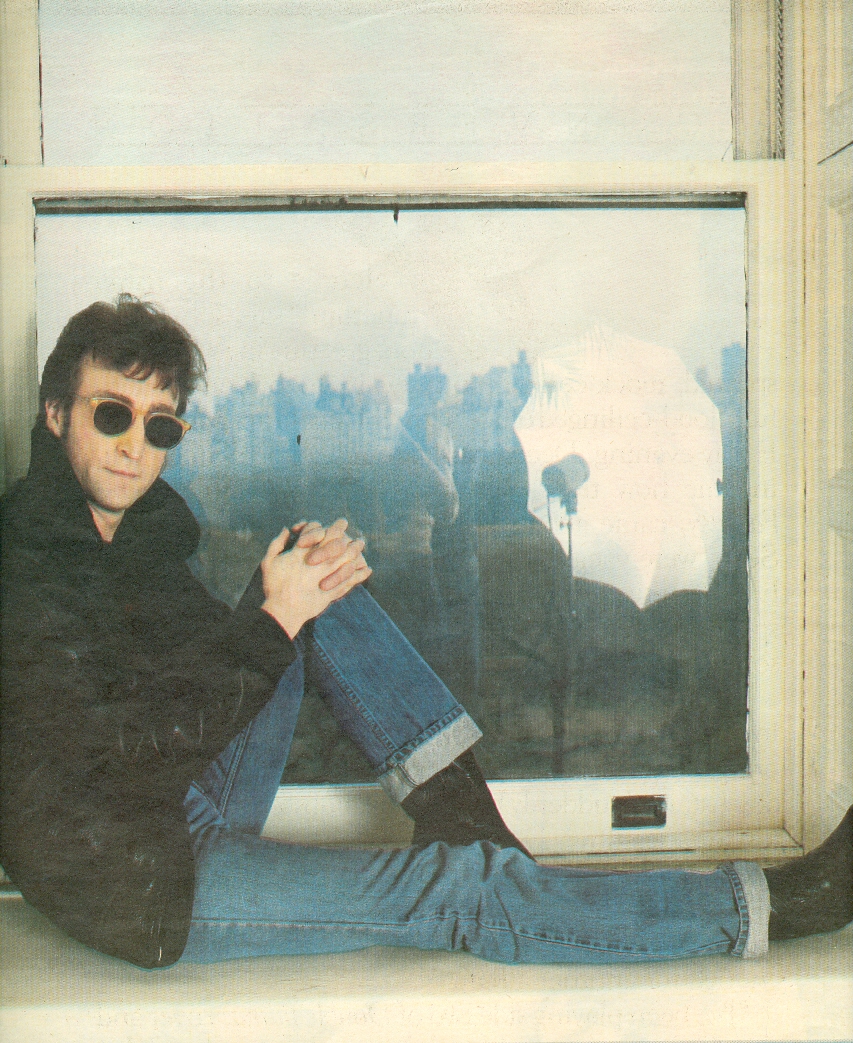
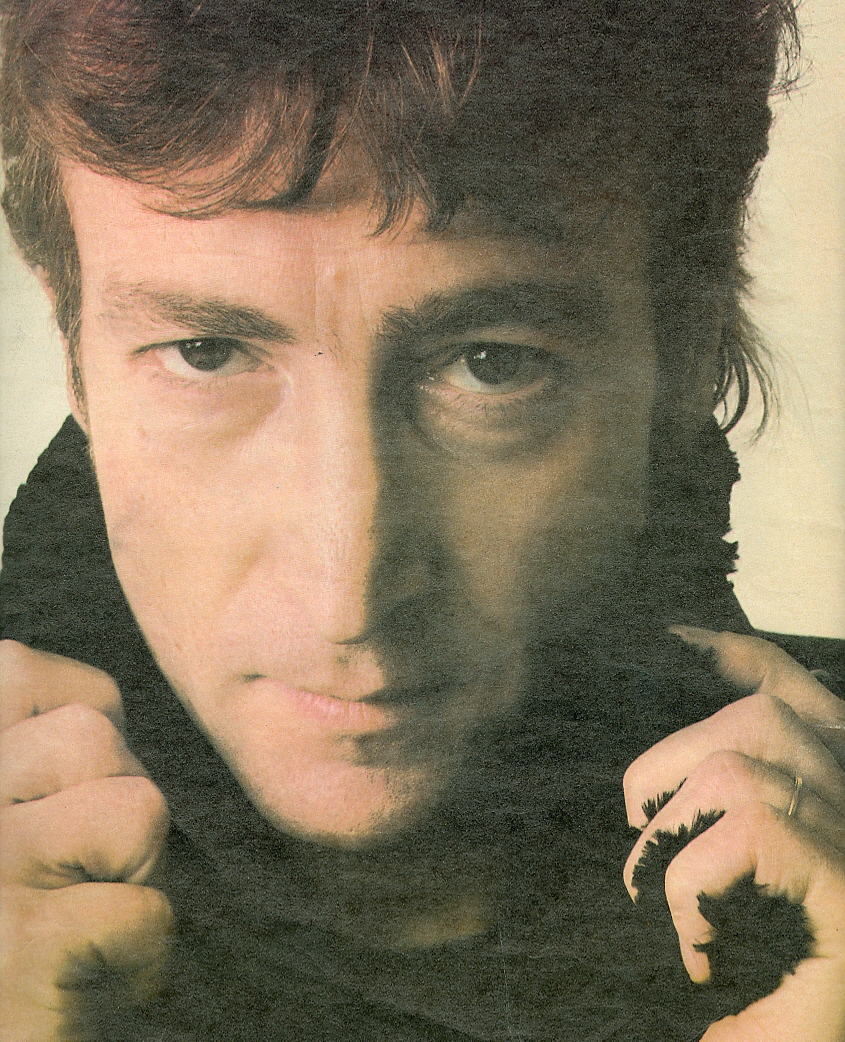
listen Lennon BBC interview 2 days before shot
(John feeling "inspirational -- in the spirit")
Cops picked up bloody guy/drove to hospital
(didn't know it was Beatle Lennon in backseat)
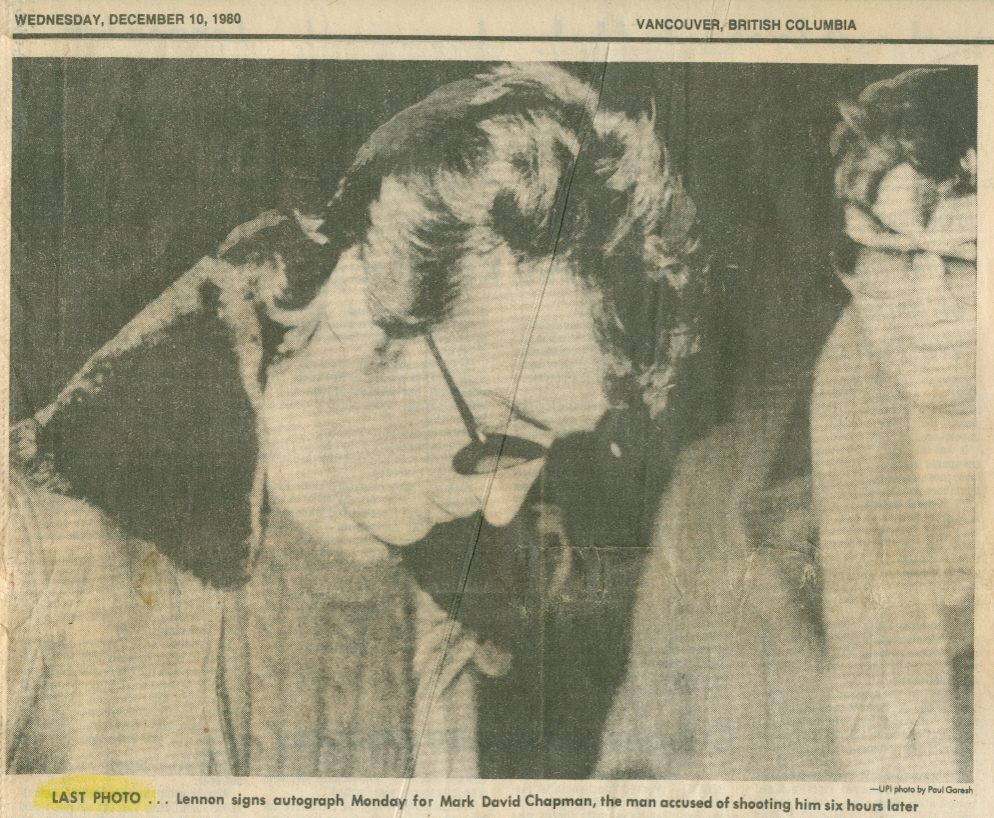


John Lennon death staged 34 years ago
December 8, 1980-2014
watch Beatles USA radio debut Dec 26, 1963
watch Beatles USA TV debut Nov 18, 1963
& JOHN WINSTON LENNON SMITH
The day John Lennon died: Jimmy Breslin writes iconic tale of NYPD cops who drove the dying Beatles star to the hospital
This is the column written by Jimmy Breslin on December 9, 1980, recounting the moment officers found the legendary Beatles singer wounded and transported him in the back of a patrol car to Roosevelt Hospital, all the while not knowing who he was...
...Tony Palma sat in a patrol car at 82nd Street and Columbus Avenue and the call came over the radio: "Man shot, 1 West 72 Street".... Another patrol car was there ahead of them, and as Palma got out he saw the officers had a man up against the building and were handcuffing him. "Where's the guy shot?" Palma said. "In the back", one of the cops said. Palma went through the gates into the Dakota courtyard and up into the office, where a guy in a red shirt and jeans was on his face on the floor. Palma rolled the guy over. Blood was coming out of the mouth and covering the face. The chest was wet with blood. Palma took the arms and Frauenberger took the legs. They carried the guy out to the street. Somebody told them to put the body in another patrol car. Jim Moran's patrol car was waiting.... Tony Palma and Herb Frauenberger put this guy with blood all over him in the backseat. As Moran started driving away, he heard people in the street shouting, "That’s John Lennon!" Moran was driving with Bill Gamble. As they went through the streets to Roosevelt Hospital, Moran looked in the backseat and said, "Are you John Lennon?" The guy in the back nodded and groaned.... Lennon's Murder: The Crime Scene (John Lennon was shot and killed on December 8, 1980, at about 10:50pm as he and his wife Yoko Ono attempted to enter the Dakota building on West 72nd Street in Manhattan across from Central Park West...)
Lennon's Murder: The Crime Scene (John Lennon was shot and killed on December 8, 1980, at about 10:50pm as he and his wife Yoko Ono attempted to enter the Dakota building on West 72nd Street in Manhattan across from Central Park West...)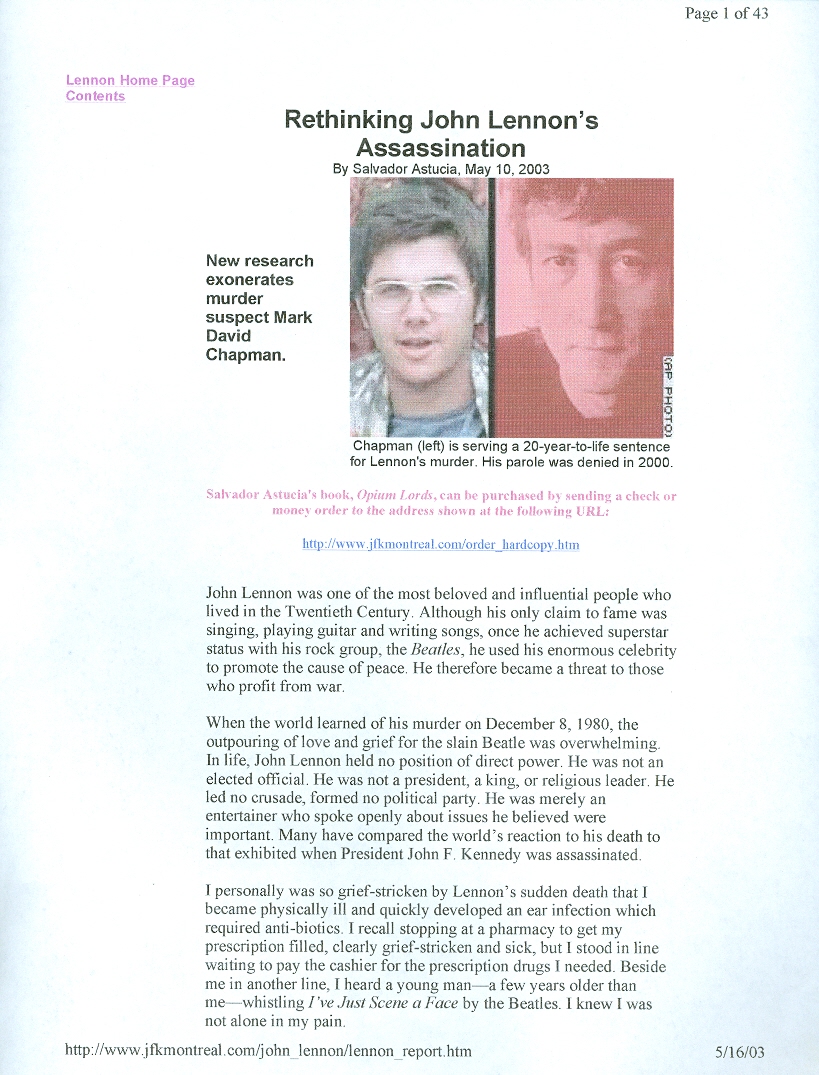

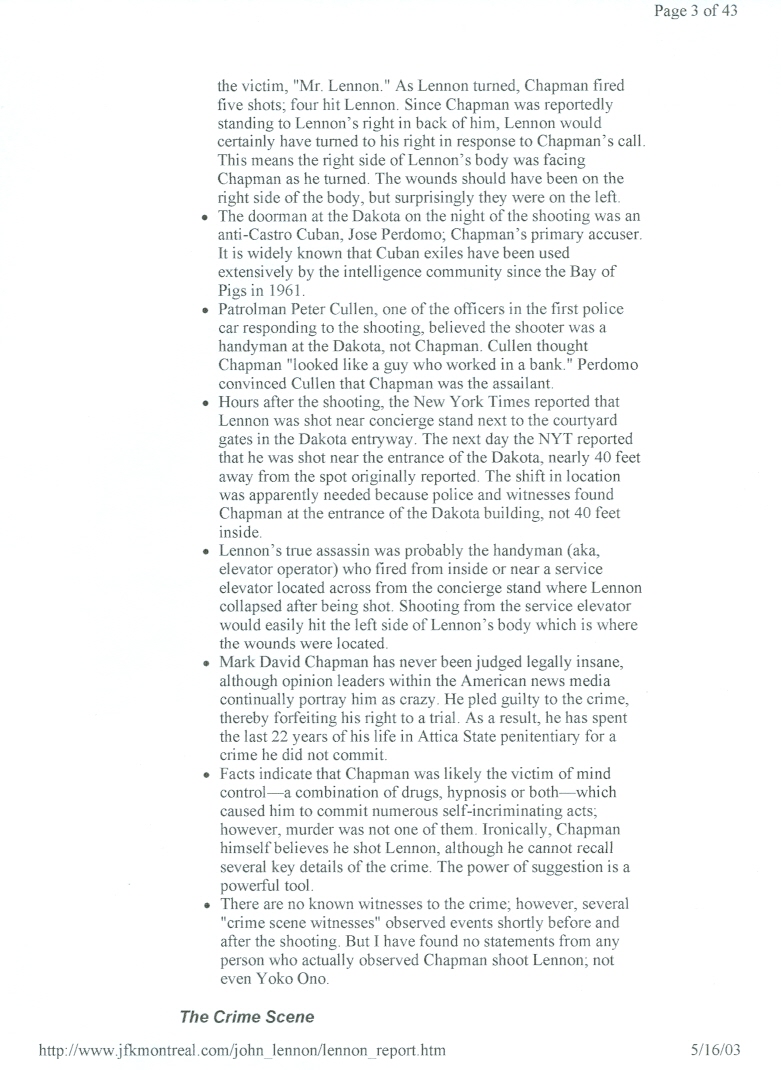
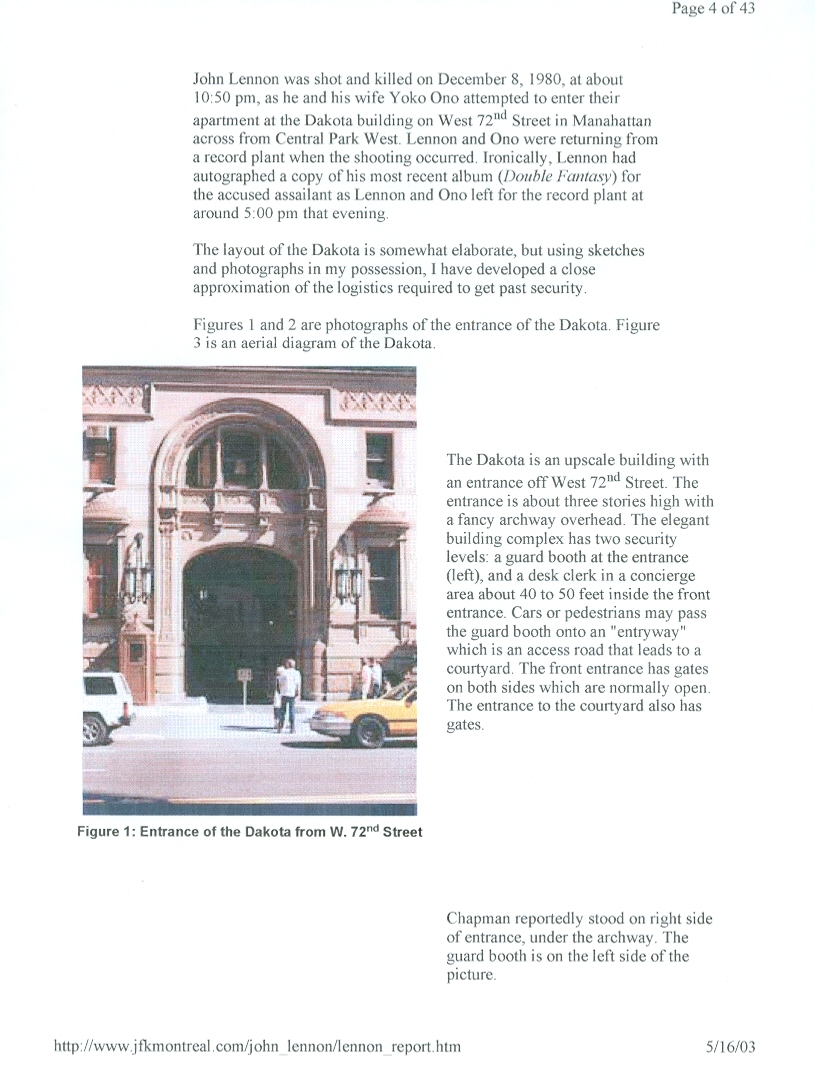

 Rethinking John Lennon's Assassination, by Salvador Astucia
Rethinking John Lennon's Assassination, by Salvador Astucia
"...It is difficult to criticize the official explanation of what happened to John Lennon because a universally accepted version does not exist. There was no trial, no testimonies, no witnesses. The police report was certainly of little value and the autopsy report is suppressed from public view....Most of the public's perception of Chapman is hocus-pocus nonsense, half-truths, media spin, and the power of suggestion. A patsy was needed to take the blame for murdering Lennon, so Chapman was set up to take the fall....")
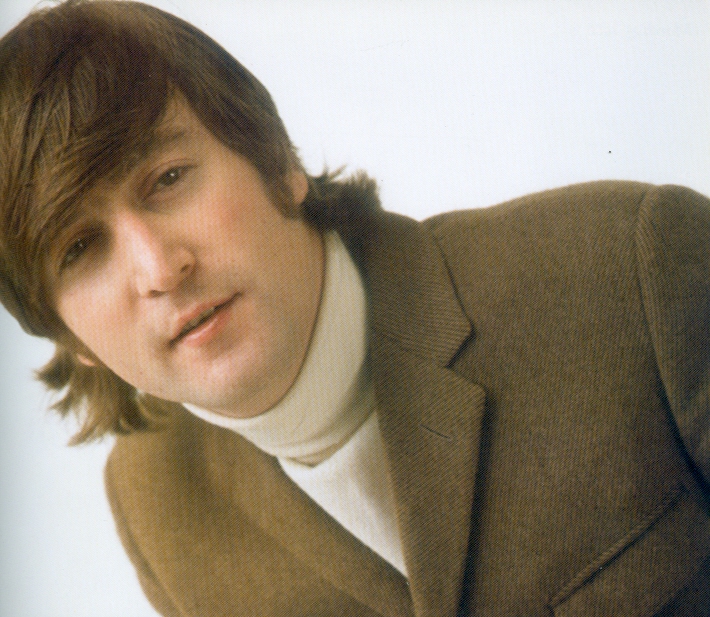
 The Beatles 365 Days ("I want the money just to be rich. The only other way of getting it is to be born rich. If you have money, that's power without having to be powerful. I often think that it's all a big conspiracy and that the winners are the government and people like us who've got the money. That joke about keeping the workers ignorant is still true; that's what they said about the Tories and the landowners and that. Then Labor were meant to educate the workers, but they don't seem to be doing that anymore"...John Lennon, March 25, 1966)
The Beatles 365 Days ("I want the money just to be rich. The only other way of getting it is to be born rich. If you have money, that's power without having to be powerful. I often think that it's all a big conspiracy and that the winners are the government and people like us who've got the money. That joke about keeping the workers ignorant is still true; that's what they said about the Tories and the landowners and that. Then Labor were meant to educate the workers, but they don't seem to be doing that anymore"...John Lennon, March 25, 1966)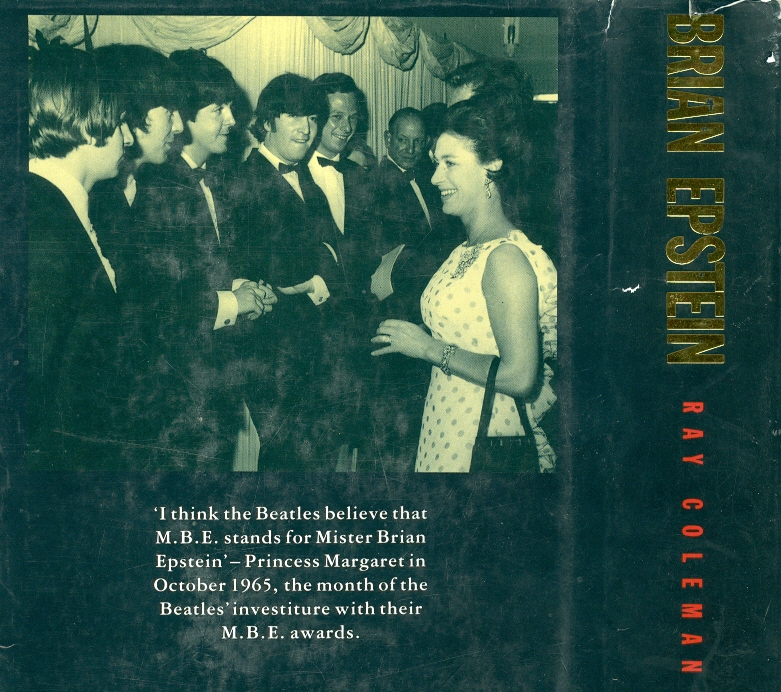 "I think the Beatles believe that M.B.E. stands for Mister Brian Epstein" ~ Princess Margaret in October 1965, the month of the Beatles' investiture with their M.B.E. awards
"I think the Beatles believe that M.B.E. stands for Mister Brian Epstein" ~ Princess Margaret in October 1965, the month of the Beatles' investiture with their M.B.E. awards Beatles books owned by Jackie Jura
Beatles books owned by Jackie Jura
Fifty years ago the Beatles conquered America, touching down in New York on February 7, 1964, and making their live USA debut two nights later on the Ed Sullivan Show. They seemed to come out of nowhere, but in fact, we knew they were coming. For months before they landed here, the Beatles were all the rage in Great Britain, and America's top news outlets had taken notice. Among them: NBC's Huntley-Brinkley Report, the leading network evening newscast of its time, and the forerunner to NBC Nightly News. Almost three months before that auspicious arrival in New York, Huntley-Brinkley featured a report by Edwin Newman on the Beatles phenomenon. It was the Beatles' first appearance on American television: November 18, 1963. The four-minute piece was seen by millions of people across the country. Not the tens of millions that would later see the Beatles live on Ed Sullivan, but still the biggest single audience for the Beatles anywhere outside England up to that moment. It's hard to believe, but a copy of that broadcast does not exist in the NBC archives. An audio recording somehow did survive, and was recently discovered in the Library of Congress. It is presented here for the first time anywhere in half a century. Beatles' first American TV appearance was on NBC Nightly News...
This piece by Steve Greenberg is part of a series of essays to mark the 50th anniversary of the Beatles' first American television appearance on CBS's "The Ed Sullivan Show". Had Capitol Records stuck to its original launch plan for the Beatles' "I Want to Hold your Hand", the insanity which gripped American teens could never have happened in time for the Ed Sullivan broadcast on February 9, 1964. Capitol had intended to release the Beatles' single in mid-January of '64, but reluctantly brought the release date up to December 26, 1963 after a Washington, DC radio station leaked the record in response to to a request by a teenage girl who'd seen a piece on British Beatlemania air on the "CBS Evening News With Walter Cronkite". Moving the release date up had an unexpected benefit. In 1963, the average American teen listened to the radio for slightly more than three hours per day. With kids out of school for all of Christmas week, that number was undoubtedly even higher. And, importantly, the most common stocking-stuffers received by teens that Christmas were transistor radios, which had become cheaper than ever....
While he became immensely popular as a singer, John Lennon - the late Beatle - had an unfulfilled wish when he died nearly 26 years ago. The legendary singer had expressed his desire to become a Scottish laird before he breathed his last to cousin Stanley Parkes, asking the latter to find him a Scottish Highland estate. "Shortly before he died, I got a letter saying he wanted to live in Scotland on a hunting and shooting estate," Contactmusic quoted Parkes, as saying. "He would not have lived on it all year round but just for a few months. John just loved Scotland and he wanted me to look after the estate for the use of the family," he added. Lennon was shot dead aged 40 on 8th December 1980 by deranged fan Mark Chapman.
~ an independent researcher monitoring local, national and international events ~
HOME PAGE
website: www.orwelltoday.com